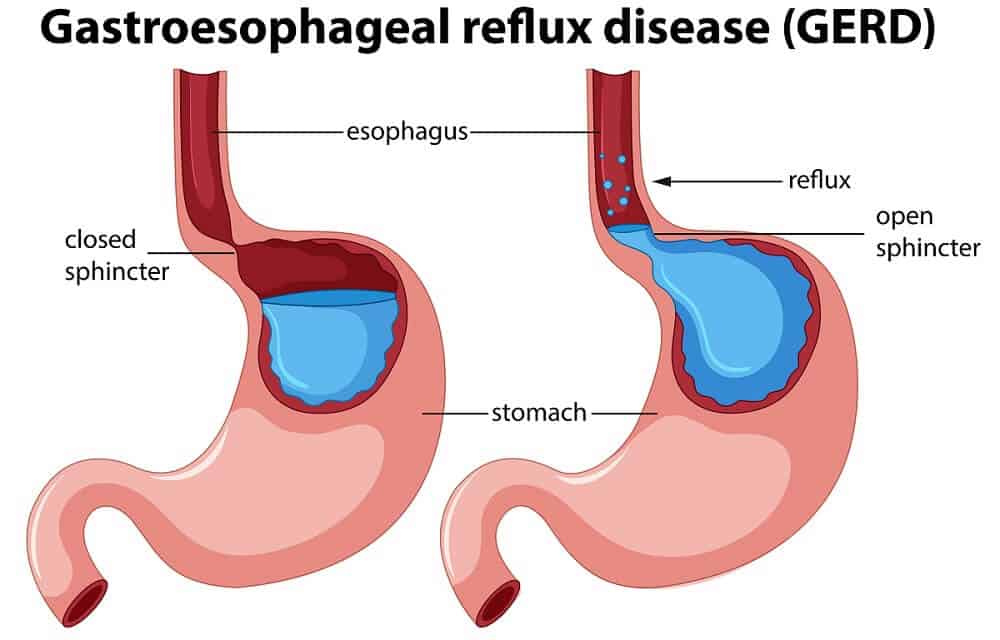
Have you felt a burning sensation on your chest, or felt and tasted acid rising up in the back of your throat at night? You’re not alone. This article will tell you how to prevent acid reflux from messing with your sleep.
More than 7.5 percent of the Australian population has heartburn according to the Royal Australian College of General Practitioners. Also known as acid reflux, this issue throws off a couple of repercussions including ruining a good night’s sleep.
Gastroesophageal reflux disease (GERD) is a more complex and severe kind of acid reflux.
What’s more, it causes mouth (especially teeth) problems, fatigue, and anxiety the next day. A few lifestyle changes will help you relieve from heartburn and get that good night’s sleep.

What is acid reflux and what causes it
Acid reflux is when the gastric acid in your stomach rises up into the esophagus because the sphincter, a muscle responsible for keeping the gastric acid in, stops functioning working properly at night.
Symptoms of acid reflux
People experiencing acid reflux might have felt the following:
- Burping
- Burning feeling on your chest
- Bad, metal taste in your mouth
- Discomfort in your throat
- Cough and hiccups
- Painful swallowing
- Difficulty breathing without acid shooting up
- Vomiting
There are various ways that ease the sphincter for acid to rise up on your esophagus. For instance, eating and drinking foods like citrus fruits, sodas, or spicy meals can shoot up the acid. Keeping your head low on the bed and off your spinal alignment increases the likelihood of acid reflux symptoms.
Causes of acid reflux
When the sphincter eases or is not functioning properly, gastric contents may flow into the esophagus. Here are some causes of acid reflux.
- Pregnancy (due to the growing pressure of your baby)
- Obesity
- Acidic foods
- Alcohol and sodas
- Medications
- Caffeine
- Lifestyle and clothing
In addition, weight gain and pregnancy can lead to heartburn because they put pressure on your abdomen, thus, driving acid reflux.
How acid reflux affects your sleep
Acid reflux is actually worse at night when people lie down and feel the gastric juice shooting up in their esophagus. Many people lie awake or are awaken due to the buildup in their chest. Here’s how it can jolt you at night:
- Acid reflux can trigger sleep apnea, a condition where the person stops breathing due to congestions and more
- Heartburn can be painful. People wake if it’s severely hurting them to fits
- Acid reflux can jolt you awake with fits of coughing or choking
- Induces you to regurgitate or vomit at some conditions
Millions of Australians are experiencing heartburn while only 11.6 percent are diagnosed by attending physicians. There are many ways to prevent acid reflux from messing with your sleep.

How to prevent acid reflux
If you’re one of the people suffering from this condition, here are ways to relieve you from it.
Avoid food and drink triggers, practice good-eating habits
Food and drinks are often the culprits of acid reflux, if you want to reduce heartburn experience, here’s a little tip for you.
- Cut out on late night snacks and stop eating and drinking three hours before sleeping.
- Avoid eating large dinners – remember to eat like a pauper!
- Limit acidic foods at night such as tomatoes, citrus fruits, or vinegar
- Cut back on spicy food
- Avoid drinks like sodas, caffeine, and alcohol
- Chew your food slowly
Wear loose, comfortable clothing upon sleep
Tight clothing can put pressure on your tummy and can trigger heartburn. If you’re someone who’s suffering from GERD, you might steer clear of wearing tight clothes even during the day.
Avoid stress
Stress can induce stomach upsets, vomiting, and heartburn. Reducing anxiety can lead to a healthier and happier stomach. If you’re taking antidepressant pills, always ask your doctor if it can increase your risk of acid reflux.
Elevate your head when sleeping
Propping up some cushions behind your head when sleeping can reduce symptoms of acid reflux. The best, however, is to invest in an adjustable bed for ease in slipping into a comfortable sleeping position.
Lose weight
Excess weight can pressure the stomach to shoot up stomach acid back to the esophagus. The sphincter will more likely to function properly when you’re overweight, so cut those extra carbs and stay fit.
Time your exercise
Wait at least two hours after eating before you can exercise. A full tummy can trigger acid reflux even during the day and on your workout (especially with sit-ups!). If it triggers heartburn, drink plenty of water as it helps with digestion. Timing your exercise in the morning and evenings relieves your stomach as well.
Chew gum
Chewing gum can create more saliva that will help break down food particles easily. What’s more, it pushes food down smoothly in the esophagus and soothes acid down the tummy.
Last resort: surgery
People resort to surgical means to keep the sphincter at bay. That way, the muscle can control the stomach acids in place and prevent heartburn. It’s more often done in patients suffering from GERD.



